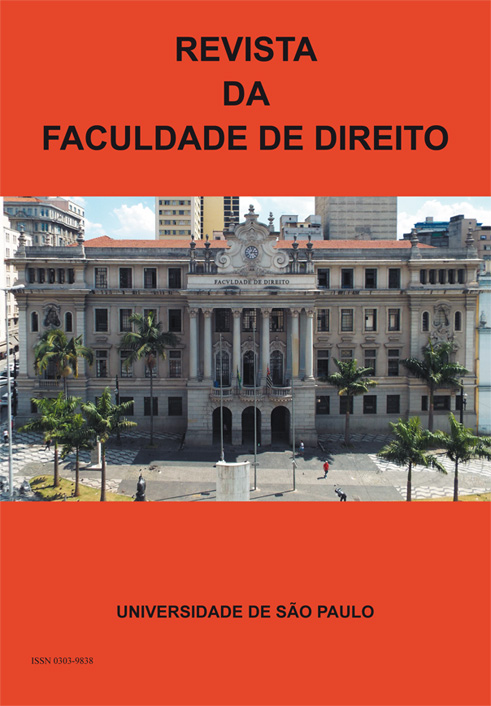The 2021 Chinese Civil Code
DOI:
https://doi.org/10.11606/issn.2318-8235.v116p39-60Keywords:
Civil Code, Chinese Civil Code, Chinese Civil Law, Codification, ConfucianismAbstract
On January 1, 2021, the Chinese Civil Code entered into force. Based on existing civil law laws in the country, this is the first Chinese law of recent times in a code format, enacted to guarantee the maintenance of social and economic order, aiming to reach development and socialism with Chinese characteristics. Although one can imagine that its normative content consists of a text that would have exclusively made use of the European legislative experience for China due to the doctrines in it, there is no way to interpret the Chinese Civil Code as if it were only a Western civil code, because part of its presuppositions are distinct from those that led to codification in the West. Chinese civil law – and consequently the Chinese Civil Code – brings several elements of Chinese philosophy, so that there are central articles that regulate norms from Confucianism, as well as other norms that seek to supplant it. The purpose of this paper was to investigate the reasons that led to the elaboration of a new Civil Code; whether it is really a new legal text or the consolidation of current law; and what are the sources of its articles.
Downloads
References
CÂNDIDO, Keila. O que é guanxi, o elemento fundamental para a relação de negócios com os chineses. Portal China2Brazil, São Paulo, 15 jul. 2020. Disponível em: https://china2brazil.com.br/o-que-e-guanxi-o-elemento-fundamental-para-a-relacao-de-negocios-com-os-chineses/. Acesso em: 20 dez. 2021.
CHINA. Civil Code of the People’s Republic of China. Adopted at the Third Session of the Thirteenth National People’s Congress on May 28, 2020a. Disponível em: http://english.www.gov.cn/atts/stream/files/5feda5b8c6d0cc300eea77ac. Acesso em: 20 dez. 2021.
CHINA. The State Council. China’s Civil Code adopted at national legislature. Beijing, May 2020b. Disponível em: http://english.www.gov.cn/news/topnews/202005/28/content_WS5ecf6850c6d0b3f0e9498dca.html. Acesso em: 20 dez. 2021.
CHINA. The State Council. Chinese lawmakers deliberate draft civil code. Beijing, May 2020c. Disponível em: http://english.www.gov.cn/news/topnews/202005/22/content_WS5ec746cfc6d0b3f0e949844d.html. Acesso em: 20 dez. 2021.
CHINA. The State Council. Efforts to explain, popularize Civil Code to be stepped up. [S. l.], Aug. 2020d. Disponível em: http://english.www.gov.cn/news/pressbriefings/202008/03/content_WS5f27b9c8c6d029c1c263720a.html. Acesso em: 20 dez. 2021.
CONFÚCIO. Li Ji. Qu Li I. English translation: James Legge. Disponível em: https://ctext.org/liji/qu-li-i. Acesso em: 20 dez. 2021.
CONFÚCIO. Os analectos. Tradução do inglês de Caroline Chang; Tradução do chinês, introdução e notas de D. C. Lau. São Paulo: L&PM Pocket, 2009.
CONFUCIUS and Confucianism. In: THEOBALD, Ulrich. Chinaknowledge.de. An Encyclopaedia on Chinese History, Literature and Art. [S. l.: s. n.], May, 2021. Disponível em: http://www.chinaknowledge.de/Literature/Classics/confucius.html. Acesso em: 20 dez. 2021.
DREHER, Rod. No Chinese good Samaritans. The American Conservative, Washington, D.C., 25 Oct. 2011. Disponível em: https://www.theamericanconservative.com/dreher/no-chinese-good-samaritans/. Acesso em: 20 dez. 2021.
FRANÇA. Loi sur la réunion des lois civiles en un seul corps, sous le titre de Code Civil des Français. [S. l.], mars 1804. Disponível em: https://www.assemblee-nationale.fr/evenements/code-civil/cc1804-loi.pdf. Acesso em: 20 dez. 2021.
GAARDER, Jostein; HELLERN, Victor; NOTAKER, Henry. O livro das religiões. Tradução Isa Mara Lando. Revisão técnica e apêndice: Antônio Flávio Pierucci. São Paulo: Companhia das Letras, 2005.
GENERAL OFFICE OF ZHONGSHAN MUNICIPAL GOVERNMENT. Profile of Dr. Sun Yat-Sen. Zhongshan: [s. n.], Oct. 2008. Disponível em: http://www.zs.gov.cn/ywb/features/sunyatsenshometown/content/post_1606240.html. Acesso em: 20 dez. 2021.
GILISSEN, John. Introdução histórica ao direito. Tradução de A. M. Hespanha e L.M. Macaísta Malheiros. 2. ed. Lisboa: Fundação Calouste Gulbenkian, 1995.
HERBOTS, Jacques H. Marking a milestone: the long-awaited Chinese ‘Civil’ Code. Dublin; Brussels, 17 May 17 2021. Disponível em: https://herbots.ie/marking-a-milestone-the-long-awaited-chinese-civil-code/. Acesso em: 20 dez. 2021.
HSÜ, Dau-Lin. The myth of the “Five human relations” of Confucius. Monumenta Serica, Abingdon, v. 29, n. 1, p. 27-37, 1970.
LEGALISM. Chinese philosophy. In: STEFON, Matt. Encyclopaedia Britannica. [S. l.: s. n.], Feb. 2019. Disponível em: https://www.britannica.com/topic/Legalism. Acesso em: 20 dez. 2021.
LEGALISM. Chinese thought and philosophy. In: THEOBALD, Ulrich. Chinaknowledge.de. An Encyclopaedia on Chinese History, Literature and Art. [S. l.: s. n.], July 2010. Disponível em: http://www.chinaknowledge.de/Literature/Diverse/legalism.html.
LUMEN LEARNING. Confucianism. In: LUMEN LEARNING. World Religions. Disponível em: https://courses.lumenlearning.com/atd-fscj-worldreligions/chapter/confucianism/. Acesso em: 20 dez. 2021.
ZHANG, Lijia. How can I be proud of my China if we are a nation of 1.4bn cold hearts? The Guardian, London, 22 Oct. 2011. Disponível em: https://www.theguardian.com/commentisfree/2011/oct/22/china-nation-cold-hearts. Acesso em: 20 dez. 2021.
Downloads
Published
Issue
Section
License
Copyright (c) 2021 Revista da Faculdade de Direito, Universidade de São Paulo

This work is licensed under a Creative Commons Attribution-NonCommercial-ShareAlike 4.0 International License.


